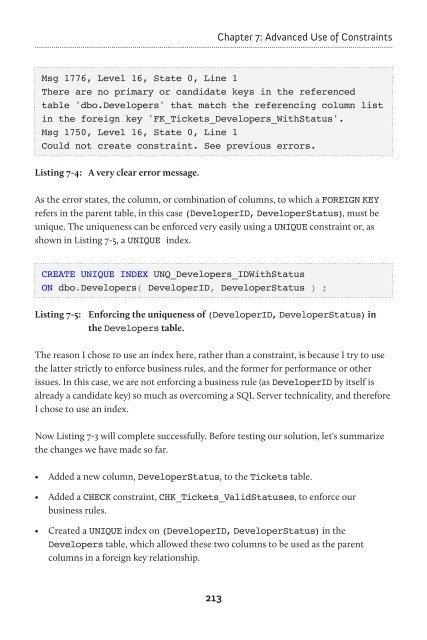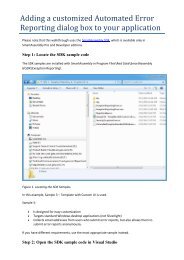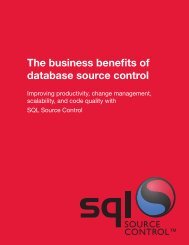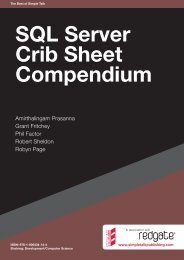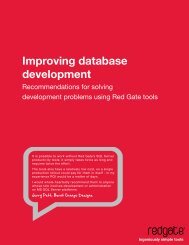- Page 5 and 6:
Chapter 2: Code Vulnerabilities due
- Page 7 and 8:
Enforcing Data Integrity in the App
- Page 9 and 10:
About the AuthorAlex Kuznetsov has
- Page 11 and 12:
IntroductionResilient T-SQL code is
- Page 13 and 14:
IntroductionCh. 02: Code Vulnerabil
- Page 15 and 16:
IntroductionSpecific examples demon
- Page 17:
IntroductionWhat this book does not
- Page 21 and 22:
Chapter 1: Basic Defensive Database
- Page 24 and 25:
Chapter 1: Basic Defensive Database
- Page 26 and 27:
Chapter 1: Basic Defensive Database
- Page 28 and 29:
Chapter 1: Basic Defensive Database
- Page 30 and 31:
Chapter 1: Basic Defensive Database
- Page 32 and 33:
Chapter 1: Basic Defensive Database
- Page 34 and 35:
Chapter 1: Basic Defensive Database
- Page 36 and 37:
Chapter 1: Basic Defensive Database
- Page 38 and 39:
Chapter 1: Basic Defensive Database
- Page 40 and 41:
Chapter 1: Basic Defensive Database
- Page 42 and 43:
Chapter 1: Basic Defensive Database
- Page 44 and 45:
Chapter 1: Basic Defensive Database
- Page 46 and 47:
Chapter 1: Basic Defensive Database
- Page 48 and 49:
Chapter 1: Basic Defensive Database
- Page 50 and 51:
Chapter 1: Basic Defensive Database
- Page 52 and 53:
Chapter 1: Basic Defensive Database
- Page 54 and 55:
Chapter 1: Basic Defensive Database
- Page 57 and 58:
Chapter 2: Code Vulnerabilitiesdue
- Page 59 and 60:
Chapter 2: Code Vulnerabilities due
- Page 61 and 62:
Chapter 2: Code Vulnerabilities due
- Page 63 and 64:
Chapter 2: Code Vulnerabilities due
- Page 65 and 66:
Chapter 2: Code Vulnerabilities due
- Page 67 and 68:
Chapter 2: Code Vulnerabilities due
- Page 69 and 70:
Chapter 2: Code Vulnerabilities due
- Page 71 and 72:
Chapter 2: Code Vulnerabilities due
- Page 73 and 74:
Chapter 2: Code Vulnerabilities due
- Page 75:
Chapter 2: Code Vulnerabilities due
- Page 78 and 79:
Chapter 3: Surviving Changes to Dat
- Page 80 and 81:
Chapter 3: Surviving Changes to Dat
- Page 82 and 83:
Chapter 3: Surviving Changes to Dat
- Page 84 and 85:
Chapter 3: Surviving Changes to Dat
- Page 86 and 87:
Chapter 3: Surviving Changes to Dat
- Page 88 and 89:
Chapter 3: Surviving Changes to Dat
- Page 90 and 91:
Chapter 3: Surviving Changes to Dat
- Page 92 and 93:
Chapter 3: Surviving Changes to Dat
- Page 94 and 95:
Chapter 3: Surviving Changes to Dat
- Page 96 and 97:
Chapter 3: Surviving Changes to Dat
- Page 98 and 99:
Chapter 3: Surviving Changes to Dat
- Page 100 and 101:
Chapter 3: Surviving Changes to Dat
- Page 102 and 103:
Chapter 3: Surviving Changes to Dat
- Page 104 and 105:
104
- Page 106:
Chapter 4: When Upgrading Breaks Co
- Page 109 and 110:
Chapter 4: When Upgrading Breaks Co
- Page 111 and 112:
Chapter 4: When Upgrading Breaks Co
- Page 113 and 114:
Chapter 4: When Upgrading Breaks Co
- Page 115 and 116:
Chapter 4: When Upgrading Breaks Co
- Page 117 and 118:
Chapter 4: When Upgrading Breaks Co
- Page 119 and 120:
Chapter 4: When Upgrading Breaks Co
- Page 121 and 122:
Chapter 4: When Upgrading Breaks Co
- Page 123 and 124:
Chapter 4: When Upgrading Breaks Co
- Page 125 and 126:
Chapter 4: When Upgrading Breaks Co
- Page 127 and 128:
Chapter 4: When Upgrading Breaks Co
- Page 130 and 131:
Chapter 4: When Upgrading Breaks Co
- Page 132 and 133:
Chapter 5: Reusing T-SQL CodeThe Da
- Page 134 and 135:
Chapter 5: Reusing T-SQL CodeIt is
- Page 136 and 137:
Chapter 5: Reusing T-SQL CodeAverag
- Page 138 and 139:
Chapter 5: Reusing T-SQL CodeBEGINS
- Page 140 and 141:
Chapter 5: Reusing T-SQL CodeWe als
- Page 142 and 143:
Chapter 5: Reusing T-SQL CodeLet's
- Page 144 and 145:
Chapter 5: Reusing T-SQL CodeStateC
- Page 146 and 147:
Chapter 5: Reusing T-SQL CodeStateC
- Page 148 and 149:
Chapter 5: Reusing T-SQL CodeBEGIN
- Page 150 and 151:
Chapter 5: Reusing T-SQL CodeSELECT
- Page 152 and 153:
Chapter 5: Reusing T-SQL CodeReusin
- Page 154 and 155:
Chapter 5: Reusing T-SQL CodeIt is
- Page 156 and 157:
Chapter 5: Reusing T-SQL CodeINSERT
- Page 158 and 159:
Chapter 5: Reusing T-SQL CodeListin
- Page 160 and 161:
Chapter 5: Reusing T-SQL CodeUnique
- Page 162 and 163: 162
- Page 164 and 165: Chapter 6: Common Problems with Dat
- Page 166 and 167: Chapter 6: Common Problems with Dat
- Page 168 and 169: Chapter 6: Common Problems with Dat
- Page 170 and 171: Chapter 6: Common Problems with Dat
- Page 172 and 173: Chapter 6: Common Problems with Dat
- Page 174 and 175: Chapter 6: Common Problems with Dat
- Page 176 and 177: Chapter 6: Common Problems with Dat
- Page 178 and 179: Chapter 6: Common Problems with Dat
- Page 180 and 181: Chapter 6: Common Problems with Dat
- Page 182 and 183: Chapter 6: Common Problems with Dat
- Page 184 and 185: Chapter 6: Common Problems with Dat
- Page 186 and 187: Chapter 6: Common Problems with Dat
- Page 188 and 189: Chapter 6: Common Problems with Dat
- Page 190 and 191: Chapter 6: Common Problems with Dat
- Page 192 and 193: Chapter 6: Common Problems with Dat
- Page 194 and 195: Chapter 6: Common Problems with Dat
- Page 196 and 197: Chapter 6: Common Problems with Dat
- Page 198 and 199: Chapter 6: Common Problems with Dat
- Page 200 and 201: Chapter 6: Common Problems with Dat
- Page 202 and 203: Chapter 6: Common Problems with Dat
- Page 205 and 206: Chapter 6: Common Problems with Dat
- Page 207 and 208: Chapter 6: Common Problems with Dat
- Page 209 and 210: Chapter 7: Advanced Use ofConstrain
- Page 211: Chapter 7: Advanced Use of Constrai
- Page 215 and 216: Chapter 7: Advanced Use of Constrai
- Page 217 and 218: Chapter 7: Advanced Use of Constrai
- Page 219 and 220: Chapter 7: Advanced Use of Constrai
- Page 221 and 222: Chapter 7: Advanced Use of Constrai
- Page 223 and 224: Chapter 7: Advanced Use of Constrai
- Page 225 and 226: Chapter 7: Advanced Use of Constrai
- Page 227 and 228: Chapter 7: Advanced Use of Constrai
- Page 229 and 230: Chapter 7: Advanced Use of Constrai
- Page 231 and 232: Chapter 7: Advanced Use of Constrai
- Page 233 and 234: Chapter 7: Advanced Use of Constrai
- Page 235 and 236: Chapter 7: Advanced Use of Constrai
- Page 237 and 238: Chapter 7: Advanced Use of Constrai
- Page 239 and 240: Chapter 7: Advanced Use of Constrai
- Page 241 and 242: Chapter 7: Advanced Use of Constrai
- Page 243 and 244: Chapter 7: Advanced Use of Constrai
- Page 245 and 246: Chapter 7: Advanced Use of Constrai
- Page 247 and 248: Chapter 7: Advanced Use of Constrai
- Page 249 and 250: Chapter 7: Advanced Use of Constrai
- Page 251 and 252: Chapter 7: Advanced Use of Constrai
- Page 253 and 254: Chapter 7: Advanced Use of Constrai
- Page 255 and 256: Chapter 8: Defensive ErrorHandlingT
- Page 257 and 258: Chapter 8: Defensive Error Handling
- Page 259 and 260: Chapter 8: Defensive Error Handling
- Page 261 and 262: Chapter 8: Defensive Error Handling
- Page 263 and 264:
Chapter 8: Defensive Error Handling
- Page 265 and 266:
Chapter 8: Defensive Error Handling
- Page 267 and 268:
Chapter 8: Defensive Error Handling
- Page 269 and 270:
Chapter 8: Defensive Error Handling
- Page 271 and 272:
Chapter 8: Defensive Error Handling
- Page 273 and 274:
Chapter 8: Defensive Error Handling
- Page 275 and 276:
Chapter 8: Defensive Error Handling
- Page 277 and 278:
Chapter 8: Defensive Error Handling
- Page 279 and 280:
Chapter 8: Defensive Error Handling
- Page 281 and 282:
Chapter 8: Defensive Error Handling
- Page 283 and 284:
Chapter 8: Defensive Error Handling
- Page 285 and 286:
Chapter 8: Defensive Error Handling
- Page 287 and 288:
Chapter 8: Defensive Error Handling
- Page 289 and 290:
Chapter 8: Defensive Error Handling
- Page 291 and 292:
Chapter 8: Defensive Error Handling


